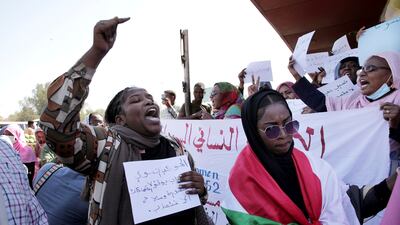Sudan’s pro-democracy groups have called for civilian factions to close ranks ahead of another round of protests against the military on Saturday, amid anger over alleged rapes by security forces during rallies on December 19.
Sudan’s main pro-democracy groups, the Forces for Freedom and Change (FFC), the Sudanese Professionals’ Association (SPA) and the Resistance Committees, have long been at odds over policy and competition for leadership of the protest movement. Internal divisions have also weakened them.
The three groups played a vital role in the 2018-2019 uprising known as the December Revolution that forced the military to remove former ruler Omar Al Bashir in April 2019.
They resumed mobilising the streets after a military takeover on October 25 that derailed Sudan’s democratic transition, organising about 10 rallies since.
“It’s necessary that we quickly consult with all revolutionary forces to build a unified popular front to defeat the coup,” the FFC said this week. “We must agree on a joint political vision and a unified co-ordinated leadership. Victory by the people in their battle against the coup depends on the unity of these forces.”
The alleged rapes of at least eight women on December 19 have been strongly condemned abroad, including by the US and Britain, and led to calls for authorities to investigate.
Allegations of rape and sexual assault were also made when security forces broke up a sit-in outside the military headquarters in Khartoum in June 2019.
At least 100 protesters were killed then, with the bodies of some thrown into the Nile.
An investigation into that incident was launched shortly after it happened, with a six-month deadline to publish its findings. Two years later, a report is still awaited amid speculation that the military and an allied militia suspended the probe over fears that the findings could implicate top brass.

Army chief and leader of the military takeover Gen Abdel Fattah Al Burhan has also said the deaths of protesters since he took power would be investigated, but he has not said who would conduct the investigation or when its findings will be announced. Activists says nearly 50 people have been killed since October 25.
Two protesters were killed and at least 300 injured in the rallies on December 19, when hundreds of thousands took to the streets in the capital Khartoum and elsewhere in the country to demand that the military quit politics.
Security forces used tear gas, stun grenades, rubber bullets and live rounds to disperse the crowds that converged on Khartoum’s Nile-side Republican Palace.
The lack of unity between pro-democracy groups was apparent in the confusion over whether the protesters should begin a sit-in outside the walls of the palace. In the end, only a small part of the crowd decided to stage a sit-in, making it relatively easy for security forces to disperse them.
The FFC, the political patron of the civilian-led government toppled by the military takeover, has been apologising to the people for its “mistakes”, although it has not publicly identified them. Activists contend the group has been affected by divisions over the sharing of government positions among its members and supporters and claims that its harsh criticism of the military has antagonised the entire institution.
“The Forces for Freedom and Change failed to come up with a discourse that endears it to the patriotic members of the military and instead adopted a very hostile narrative, not only with the army but with the police and security agencies,” said political analyst Youssef Al Galal.
“The goodwill of the military’s top brass outside today’s ruling generals is needed. Taking to the streets and demonstrating alone cannot topple a regime or bring change.”

Sulaima Ishaq, an activist who runs a state agency combating violence against women, told The National that she knew of eight cases of rape by security forces on December 19, of which two were fully documented by the victims.
The UN Human Rights Office said it had received 13 allegations of rape and gang rape by security forces during the protests.
In a statement, the US, EU, UK and other western countries condemned the alleged rapes and urged that “perpetrators are held accountable regardless of affiliation".
Troops, police and members of the government-sanctioned Rapid Support Forces militia took part in dispersing the protesters on Sunday.
Ms Ishaq said the rapes took place on side streets near the Republican Palace soon after darkness fell and that the victims were separated from larger groups under the cover of intense teargas volleys by the security forces.
On Thursday, hundreds of women marched in Khartoum’s district of Omdurman, a traditional hotbed of dissent, and other cities across Sudan to protest against the alleged rapes. The marches were organised by women’s groups and neighbourhood resistance committees.











